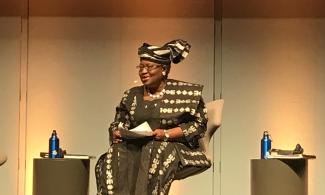
Okonjo-Iweala, who was a Managing Director of the World Bank and currently sits on Twitter's Board of Directors, also said the greatest danger corruption poses for a nation — beyond the diversion of public funds — is that it corrodes its value system.

Ngozi Okonjo-Iweala, a former Minister of Finance, has identified a very small percentage of Nigeria’s population — the “kleptocratic elites” maintaining a “stranglehold” on the country — as the ones giving Nigeria a very bad name.
She stated this while speaking at a plenary session tagged ‘Promoting Good Governance for Peace and Security’ at the 2018 International Anti-Corruption Conference (IACC) going on in Copenhagen, Denmark.
She noted that this realisation — and for majority of people — made her commit to fight corruption.
Nigeria's two-time Minister for Finance said the fight against corruption should not be left to the government alone but individuals must be involved as well.
“We, Nigerians, have to commit and it’s not just government; each individual has to make commitment to try to fight,” she said.
Okonjo-Iweala, who was a Managing Director of the World Bank and currently sits on Twitter's Board of Directors, also said the greatest danger corruption poses for a nation — beyond the diversion of public funds — is that it corrodes its value system.
She said: “People get passionate about the issue of money diverted that could have been used for education or health. We all talk about it, but let me tell you that the worst thing about corruption is the way it corrodes the value of a society; the way it insidiously undermines integrity, trust, and the very fabric of society.
“What I found in my country now [is that] it is very difficult to get a young person that believes they can actually achieve something on merit. The person wants a job, they look for someone who is going to introduce them to someone and that is because of that.
“We cannot allow a small minority to undermine the majority in a country, so that is the issue and we cannot allow the young people to lose hope because we have got a vibrant, interesting country and we have got a vibrant interesting continent and we have to fight for it.

“When we talk about fight corruption; we focus on punitive... and on getting the people who perpetuated it and not allowing impunity and that is very important; that matters and we must do it. But, it is not all, because if we don’t fix the underlying system that allowed the corruption in the first place, you will just get a new set of people and a new set of corruption.
“The difference between developing and developed countries is not that the developed countries have more integrity or more morals, it is just that over time they have built stronger institutions and we see that even that can be undermined.
“Institutions matter in both developed and developing countries to fight corruption, and the minute a society turns its attention away from safeguarding its institutions and values, it is shooting itself in the foot. So, what I found is that in my country, we had weak, very weak institutions to non-existent institutions.”
She added that while institutions might not solve all the problems, they reduce the likelihood of corruption.
Okonjo-Iweala also said an independent judiciary and strong civil societies are other ways to fight corruption.
Going further, she acknowledged that building a strong institution is not as easy, hence the need for national and international organisations to work together.